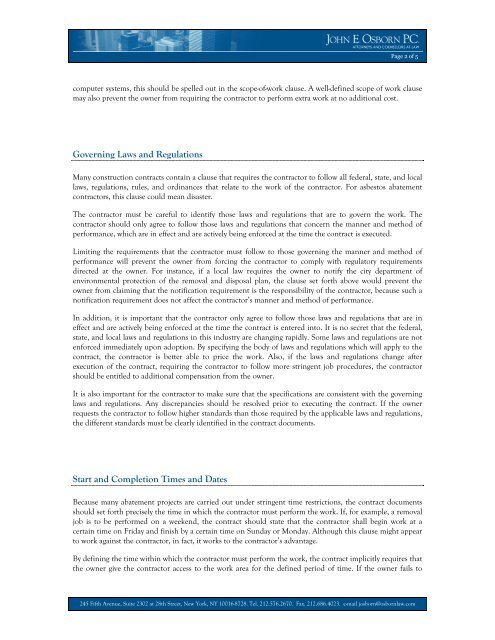Asbestos Abatement Contractor Agreements The Scope of Work
Asbestos Abatement Contractor Agreements The Scope of Work
Asbestos Abatement Contractor Agreements The Scope of Work
You also want an ePaper? Increase the reach of your titles
YUMPU automatically turns print PDFs into web optimized ePapers that Google loves.
Page 2 <strong>of</strong> 5<br />
computer systems, this should be spelled out in the scope-<strong>of</strong>-work clause. A well-defined scope <strong>of</strong> work clause<br />
may also prevent the owner from requiring the contractor to perform extra work at no additional cost.<br />
Governing Laws and Regulations<br />
Many construction contracts contain a clause that requires the contractor to follow all federal, state, and local<br />
laws, regulations, rules, and ordinances that relate to the work <strong>of</strong> the contractor. For asbestos abatement<br />
contractors, this clause could mean disaster.<br />
<strong>The</strong> contractor must be careful to identify those laws and regulations that are to govern the work. <strong>The</strong><br />
contractor should only agree to follow those laws and regulations that concern the manner and method <strong>of</strong><br />
performance, which are in effect and are actively being enforced at the time the contract is executed.<br />
Limiting the requirements that the contractor must follow to those governing the manner and method <strong>of</strong><br />
performance will prevent the owner from forcing the contractor to comply with regulatory requirements<br />
directed at the owner. For instance, if a local law requires the owner to notify the city department <strong>of</strong><br />
environmental protection <strong>of</strong> the removal and disposal plan, the clause set forth above would prevent the<br />
owner from claiming that the notification requirement is the responsibility <strong>of</strong> the contractor, because such a<br />
notification requirement does not affect the contractor’s manner and method <strong>of</strong> performance.<br />
In addition, it is important that the contractor only agree to follow those laws and regulations that are in<br />
effect and are actively being enforced at the time the contract is entered into. It is no secret that the federal,<br />
state, and local laws and regulations in this industry are changing rapidly. Some laws and regulations are not<br />
enforced immediately upon adoption. By specifying the body <strong>of</strong> laws and regulations which will apply to the<br />
contract, the contractor is better able to price the work. Also, if the laws and regulations change after<br />
execution <strong>of</strong> the contract, requiring the contractor to follow more stringent job procedures, the contractor<br />
should be entitled to additional compensation from the owner.<br />
It is also important for the contractor to make sure that the specifications are consistent with the governing<br />
laws and regulations. Any discrepancies should be resolved prior to executing the contract. If the owner<br />
requests the contractor to follow higher standards than those required by the applicable laws and regulations,<br />
the different standards must be clearly identified in the contract documents.<br />
Start and Completion Times and Dates<br />
Because many abatement projects are carried out under stringent time restrictions, the contract documents<br />
should set forth precisely the time in which the contractor must perform the work. If, for example, a removal<br />
job is to be performed on a weekend, the contract should state that the contractor shall begin work at a<br />
certain time on Friday and finish by a certain time on Sunday or Monday. Although this clause might appear<br />
to work against the contractor, in fact, it works to the contractor’s advantage.<br />
By defining the time within which the contractor must perform the work, the contract implicitly requires that<br />
the owner give the contractor access to the work area for the defined period <strong>of</strong> time. If the owner fails to<br />
245 Fifth Avenue, Suite 2302 at 28th Street, New York, NY 10016-8728. Tel. 212.576.2670. Fax. 212.686.4023. e-mail josborn@osbornlaw.com


